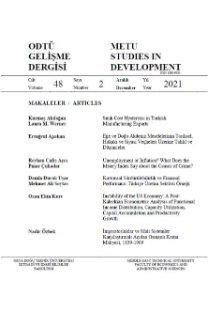The dichotomy between piety and zealotry: Reflections on the relation between religiosity and democratic secularism
Dindarlık ve bağnazlık ikilemi: Dinsellik ve demokratik sekülerizm ilişkisi üzerine düşünceler
___
- AUDI, R. (1989), "The Separation of Church and the State and the Obligations of Citizenship", in Philosophy and Public Affairs 18(3), 259-96.
- AUDI, R. (2000), Religious Commitment and Secular Reason, Cambridge: Cambridge University Press.
- BADER, V. (2007), Secularism or Democracy?: Associational Governance of Religious Diversity, Amsterdam: Amsterdam University Press.
- CANTOR, N. F. (2004), Antiquity: From the Birth of Sumerian Civilization to the Fall of the Roman Empire, New York: Haper Collins.
- DWORKIN, R. (2006), Is Democracy Possible Here?: Principles for a New Political Debate, New Jersey: Princeton University Press.
- GAUCHET, M. (1997), The Disenchantment of the World: A Political History of Religion, trans. Oscar Burge, Princeton: Princeton University Press.
- HABERMAS, J. (2006), "Religion in the Public Sphere" in European Journal of Philosophy 14(1), 1-15.
- HABERMAS, J. (2011), "'The Political': The Rational Meaning of a Questionable Inheritance of Political Theology" in The Power of Religion in the Public Sphere, ed E. Mendieta and J. Vanantwerpen, New York: Columbia University Press, 15-33.
- GREENAWALT, K. (2009), Religion and the Constitution Volume I: Free Exercise and Fairness, New Jersey: Princeton University Press.
- GREENAWALT, K. (2009), Religion and the Constitution Volume II: Establishment and Fairness, New Jersey: Princeton University Press.
- KADRI, S. (2011), Heaven on Earth: A Journey through Shari`a Law, London: The Bodley Head.
- LABORDE, C. (2008), Critical Republicanism: The Hijab Controversy and Political Philosophy, Oxford: Oxford University Press.
- LESSING, G. H. (2000), Nathan der Weise, Berlin: Reclam.
- LILLA, M. (2008), The Stillborn God: Religion, Politics and the Modern West, New York: Vintage.
- MACEDO, S. (1995), "Liberal Civic Education and Religious Fundamentalism: The Case of God v. John Rawls", Ethics 105, 468-496.
- NUSSBAUM, M. (2010), Liberty of Conscience: In Defense of America's Tradition of Religious Equality, New York: Basic Books.
- O`NEILL, O. (1989), "Reason and Politics in the Kantian Enterprise", in Constructions of Reason: Explorations in Kant`s Practical Philosophy, Cambridge: Cambridge University Press.
- O`NEILL, O. (1992), "Vindicating Reason", in The Cambridge Companion to Kant, Cambridge: Cambridge University Press.
- RAWLS, J. (1993), Political Liberalism, New York: Columbia University Press.
- RAWLS, J. (1997), "The Idea of Public Reason Revisited" in The University of Chicago Law Review 64(3), 765-807.
- RORTY, R. (1994), "Religion as Conversation-Stopper", Common Knowledge 3(1), 1-6.
- SCHMITT, C. (1996), The Concept of the Political, trans George Schwab, Chicago: University of Chicago Press.
- SCHMITT, C. (2003), The Nomos of the Earth in the International Law of the Jus Publicum Europeaum, trans Gary L. Ulmen, New York: Telos.
- SCHMITT, C. (2005), Political Theology: Four Chapters on the Concept of Sovereignty, trans George Schwab, Chicago: University of Chicago Press.
- SCHMITT, C. (2008), The Leviathan in the State Theory of Thomas Hobbes: Meaning and Failure of a Political Symbol, trans George Schwab, Chicago: University of Chicago Press.
- SLOTERDIJK, P. (2009), God's Zeal: The Battle of the Three Monotheisms, trans Wieland Hoban, Cambridge: Polity.
- STOUT, J. (2008), "2007 Presidential Address: The Folly of Secularism", Journal of American Academy of Religion 76 (3), 533-544.
- TAYLOR, C. (2011), "Why We Need a Radical Definition of Secularism" in The Power of Religion in the Public Sphere, ed E. Mendieta and J. Vanantwerpen, New York: Columbia University Press, 34-59.
- WEITHMAN, P. (2001), Religion and the Obligations of Citizenship, Cambridge: Cambridge University Press.
- WOLTERSTORFF, N. (1997), "The Role of Religion in Decision and Discussion of Political Issues" in Robert Audi and Nicholas Wolterstorff (eds), Religion in the Public Square, Lanham, MD: Rowman and Littlefield.
- ISSN: 1010-9935
- Yayın Aralığı: 3
- Başlangıç: 2018
- Yayıncı: ODTÜ İİBF
GÖKHAN KARAGONLAR, ENGİN BAĞIŞ ÖZTÜRK, Ömür N. T. ÖZMEN
Lim, G. C. and McNelis, D., Computational Macroeconomics for the Open Economy, MIT Press, 2008
Yönetim güçlendirmenin firmanın finansal performansı ve risk alma davranışı üzerindeki etkisi
TÜLAY İLHAN NAS, Ayşegül ÇARKCI
İç halkaya dâhil olmak: Türkiye'deki büyük aile holdinglerinde profesyonel yöneticiler
BEHLÜL ÜSDİKEN, F Nazlı ŞENOL, Nazlı ŞENOL
